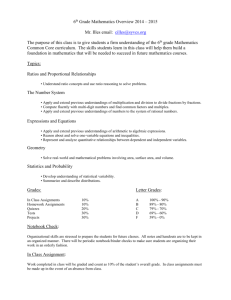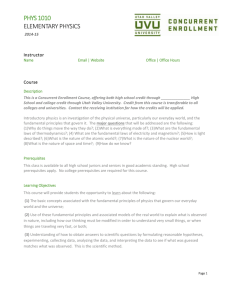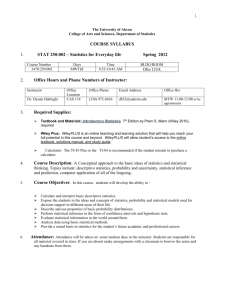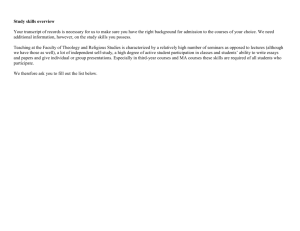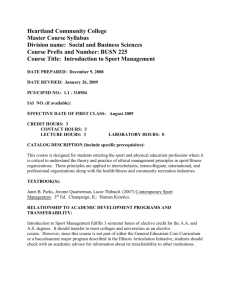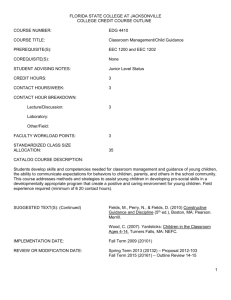ECON220_Dec2012 - Heartland Community College
advertisement
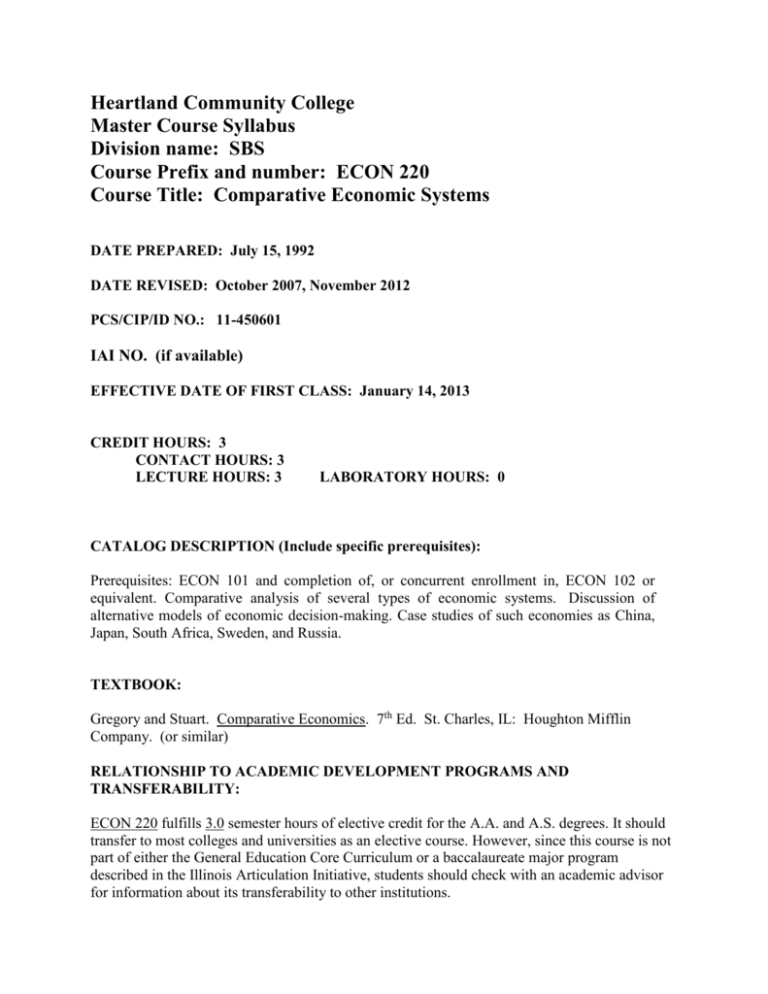
Heartland Community College Master Course Syllabus Division name: SBS Course Prefix and number: ECON 220 Course Title: Comparative Economic Systems DATE PREPARED: July 15, 1992 DATE REVISED: October 2007, November 2012 PCS/CIP/ID NO.: 11-450601 IAI NO. (if available) EFFECTIVE DATE OF FIRST CLASS: January 14, 2013 CREDIT HOURS: 3 CONTACT HOURS: 3 LECTURE HOURS: 3 LABORATORY HOURS: 0 CATALOG DESCRIPTION (Include specific prerequisites): Prerequisites: ECON 101 and completion of, or concurrent enrollment in, ECON 102 or equivalent. Comparative analysis of several types of economic systems. Discussion of alternative models of economic decision-making. Case studies of such economies as China, Japan, South Africa, Sweden, and Russia. TEXTBOOK: Gregory and Stuart. Comparative Economics. 7th Ed. St. Charles, IL: Houghton Mifflin Company. (or similar) RELATIONSHIP TO ACADEMIC DEVELOPMENT PROGRAMS AND TRANSFERABILITY: ECON 220 fulfills 3.0 semester hours of elective credit for the A.A. and A.S. degrees. It should transfer to most colleges and universities as an elective course. However, since this course is not part of either the General Education Core Curriculum or a baccalaureate major program described in the Illinois Articulation Initiative, students should check with an academic advisor for information about its transferability to other institutions. COURSE OBJECTIVES (Learning Outcomes): Course Outcomes Evaluate the strengths and weaknesses of various economic systems, including the role of government, resource allocation, and price determination of inputs and outputs Identify the problems various economic systems encounter and ways those systems address those problems. Communicate how different economic theories affect the development of social and political systems of nations. Understand the definition and classification of different economic systems. Understand the characteristics of capitalism, socialism, and mixed economies in theory and practice. Evaluate the effects of culture on the development of economic systems. Discuss the importance of diversity and multicultural issues on the performance of economic systems. Create a theoretically perfect economic system. Compare institutions within differing economic systems and analyze their impact on effective economic performance. General Education Outcomes Range of Assessment Methods CT2 Writing assignments, quizzes, exams, projects, presentations, discussions. PS2 Writing assignments, quizzes, exams, projects, presentations, discussions. CO2 Writing assignments, quizzes, exams, projects, presentations, discussions. CT1 CO2 DI5 CT3 PS4 Writing assignments, quizzes, exams, projects, presentations, discussions. Writing assignments, quizzes, exams, projects, presentations, discussions. Writing assignments, quizzes, exams, projects, presentations, discussions. Writing assignments, quizzes, exams, projects, presentations, discussions. Writing assignments, projects, presentations, discussions. Writing assignments, quizzes, exams, projects, presentations, discussions. COURSE/LAB OUTLINE: I. II. Describe an Economic System A. Assessing freedom of choice B. Assessing the population physical welfare C. Assessing the systems economic stability Comparison of Economic Systems A. Categorization – primatial, tribal, capitalistic, socialistic, and mixed systems B. Determining and accessing strengths and weaknesses III. IV. Describing Existing and Evolving Systems: Case Studies A. Survey of capitalist nations B. Survey of socialist nations/planned economy C. Survey of historical/recent evolution of economic systems Debates of Issues in Economic Systems A. Resource allocation: Planned or market B. Organizing production: Centralization or decentralization C. Individualism and social classes METHOD OF EVALUATION (Grading System): The final grade in this course will be determined by the total points earned through completion of selected activities from the following: Writing Assignments* Quizzes Presentations Exams Projects Discussion Min. – Max. 20% - 100% 0% - 80% 0% - 80% 0% - 80% 0% - 80% 0% - 80% * Students will be assigned a minimum of 15 pages of single-spaced writing which will account for at least 20% of the final course grade. Letter grades will be based on the percentage of points earned in the course in accordance with the following scale: ABCDF- 90 – 100% 80 - 89% 70 - 79% 60 - 69% 59 - 0% REQUIRED WRITING AND READING: This course requires approximately 30-40 pages of reading per week or 500 per semester. A minimum of 15 pages of college level writing is required in this course. Writing assignments include papers of various lengths, essay exams and various projects as deemed appropriate by the instructor.





